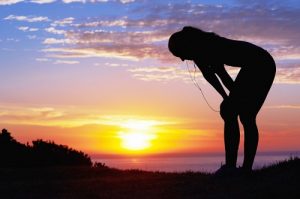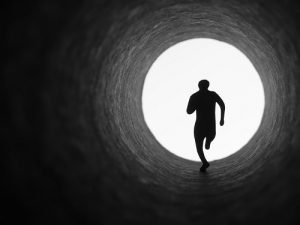Spend much time with an endurance athlete, and two things will likely happen: They’ll attempt to talk you into signing up for a race, and they’ll tell you about their sports-related injuries. Athletes develop a bag of tricks for injury prevention and recovery: foam and stick rollers, stretching, kinesiology tape, R.I.C.E. (rest, ice, compression, elevation), Epsom salt baths, supplements, a stockpile of ibuprofen, and a high-quality sleep schedule.
However, even the most fastidious athlete can experience strain, and sports medicine professionals can help not only prevent and recover from injury, but also reach optimal performance.
Heidi Peterson, Certified Athletic Trainer at North Spokane Physical and Sports Therapy, says, “We pride ourselves on being behind the scenes.” Athletic trainers help athletes prevent and recognize injuries related to their sport. From the sidelines, they watch athletes perform, recommend adjustments, and rush to the field when something goes wrong. But most of their efforts take place before game day.
Peterson makes frequent appearances at recreational events like triathlons, helping athletes prevent slight issues from becoming full-blown injuries. On the spot, Peterson provides informed, targeted exercises that can nip injuries in the bud. “If anything affects an athlete’s ability to participate,” she says, “our job is to either care for them or get them to the correct caregiver and collaborate on that person’s care.”

“Collaboration” is a word you’ll hear repeatedly as you speak with sports medicine professionals. “Sometimes I feel like a quarterback,” says Tricia Mack, Physical Therapist at Rockwood Physical Therapy and Sports Medicine. “We need to know which professionals to pull in when.” Unlike athletic trainers, physical therapists help patients of all kinds – not just athletes – develop, restore, and maintain movement and physical function.
Mack emphasizes that one athlete’s program with one physical therapist won’t necessarily work for another. “We work with athletes and, without breaking their spirit, show them what’s wrong. We then bring them back up and motivate them. The best thing is not that we can make them injury-free, but that we can make them faster by identifying their wasted energy. We convince them to have patience now, which will benefit them in the long run.”
Jodi McMahon, Licensed Acupuncturist at Longevity Health Center, agrees that many modalities of professionals contribute to a healthy athlete. “To prevent a whole cycle of events, take care of the issue before it’s really hurting. The longer you wait, the more out of alignment the body gets.”
McMahon specializes in trigger point release, which is geared toward athletes. When a muscle is contracted and doesn’t release, it forces other muscles to respond and compensate. Trigger point release involves using acupuncture points to help contracted muscles relax. “Trigger point release is more effective for athletes than anyone else because they’re working those muscles harder than most people are.” Acupuncturists develop a keen sense of the body. “I call it ‘body mapping’ –knowing what the structure is supposed to feel like. That knowledge only comes with experience.”
McMahon understands that some people are doubtful, even fearful. She once questioned acupuncture’s validity herself. “The first time I experienced acupuncture as a patient, I was a complete skeptic. I thought, ‘Aren’t you going to dance around the table or something?’ But I left feeling so much better. After that one treatment, I looked into going to school for it. It was that dramatic of a difference for me.”

Mental prevention, like physical prevention, can help athletes perform optimally. Sport psychologists can help endurance athletes develop mental strategies from goal setting and self-talk to mental imagery and controlled breathing. Endurance athletes often hire coaches, but Jon Hammermeister, Sports Psychologist and Professor of Physical Education at Eastern Washington University, explains that “while coaches are usually well-versed in a wide variety of sport-related issues, most are not experts in sport psychology. I have met very few coaches who are also licensed psychologists or Association of Applied Sport Psychology professionals.” The AASP certification is granted to professionals who show competency in performance enhancement, motivation, counseling skills, biomechanics, exercise physiology, professional ethics, and others.
Hammermeister distinguishes between clinical psychologists, who address issues like depression and anxiety disorders, and educational sport psychologists, who work with athletes on building mental strength. “Working with a sport psychology professional – even for one or two sessions – can help athletes add some important cognitive techniques to both their training and their race day repertoire.”
Injury may be inevitable for endurance athletes, but by building a support team of collaborative specialists, you can spend more time performing at your highest mental and physical level – and less time sidelined in recovery. //













